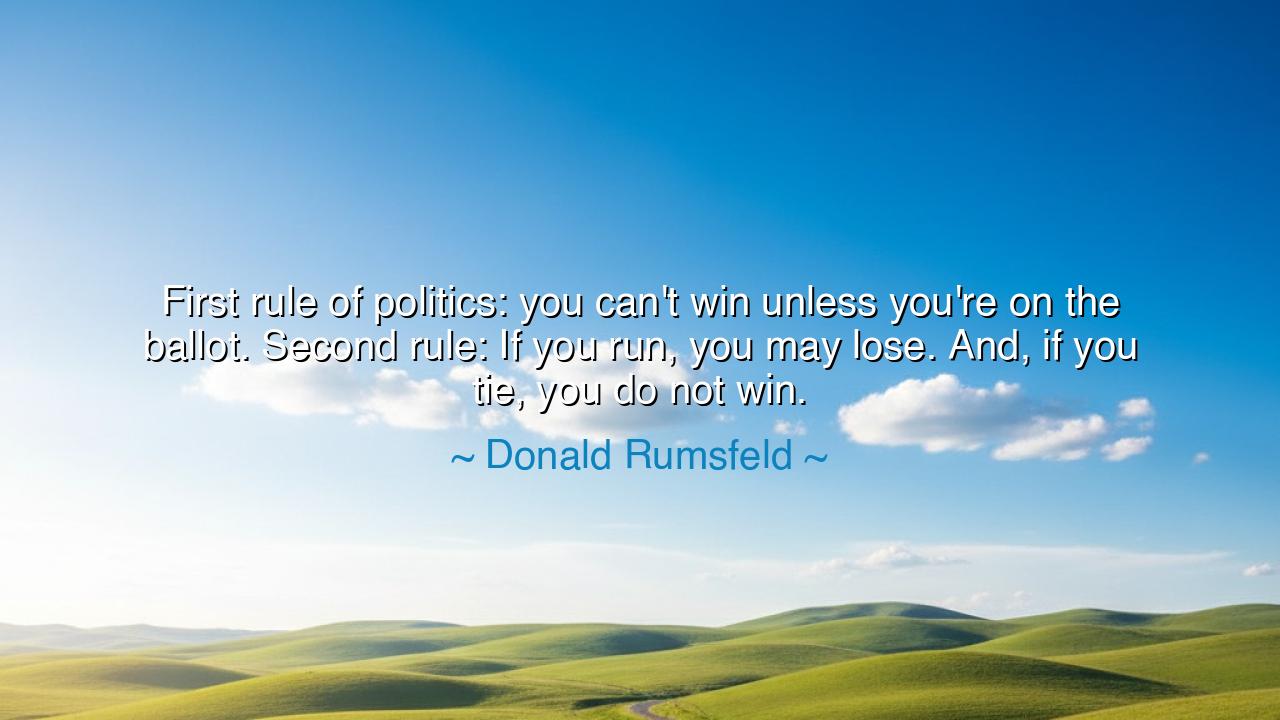
First rule of politics: you can't win unless you're on the
First rule of politics: you can't win unless you're on the ballot. Second rule: If you run, you may lose. And, if you tie, you do not win.






The words of Donald Rumsfeld — “First rule of politics: you can’t win unless you’re on the ballot. Second rule: If you run, you may lose. And, if you tie, you do not win” — carry the crisp, unsentimental wisdom of a man who knew the sharp edges of power. In them lies the lesson that politics is not merely about ideals or speeches, but about the stark realities of contest and survival. To dream of victory is nothing unless one has the courage to stand upon the ballot; to run is to embrace both the hope of triumph and the certainty of risk.
At its heart, this saying unmasks the discipline of politics as both practical and merciless. To sit aside, to complain, or to speak without standing for election is to surrender the game before it begins. Yet even to step forward and run is to embrace the possibility of defeat, for every campaign is a gamble upon the will of the people. And in this contest, there is no middle ground: to tie is to fail, for history remembers victors, not stalemates. Rumsfeld thus teaches that true power belongs only to those willing to risk all, knowing they may gain nothing.
History provides stern examples. Consider Abraham Lincoln, who lost elections more than once before rising to the presidency. Had he feared the sting of defeat, he would never have stood upon the ballot, and the United States might have fractured forever. Likewise, Winston Churchill, cast aside by his country in peacetime, returned when crisis called, proving that loss is not the end, but part of the struggle toward ultimate victory. Their lives embody Rumsfeld’s laws: one cannot win without daring to enter, and one cannot fear the shadow of loss.
Yet his words also remind us of humility. Not all who run are crowned; not all who prepare are chosen. The path of politics is strewn with those who labored with devotion, only to be cast down by numbers, factions, or fate. To step into the arena is to surrender the illusion of certainty. It is to trust the people, or fortune, or history itself, to decide your worth. The lesson is not despair, but acceptance: in politics, as in life, loss is as real a teacher as triumph.
Let future generations remember this wisdom: to change the world, one must first dare to step onto the ballot. To run is to embrace the storm of loss as well as the crown of victory. And if the contest ends in a tie, the truth remains — only decisive courage carries the day. Rumsfeld’s words, though sharp and unsentimental, carry a timeless truth: that the road to power belongs to the bold, and that even in defeat, the act of running shapes the destiny of nations.






MMinh
Rumsfeld’s blunt approach to the rules of politics is intriguing, but it also raises some questions. If a tie isn’t considered a win, what happens to those who lose in close races? Is there room for them to continue contributing to political discourse, or does the system only reward those who come out on top? Could this make it harder for more diverse or alternative voices to be heard in the long run?
GHGiang Hong
I get the logic behind Rumsfeld's quote, but it also seems to reveal the cynical side of politics. It almost feels like there's no room for compromise, which is essential in a democratic society. If the focus is entirely on winning, do we risk losing sight of what politics is meant to achieve? Could this cutthroat attitude actually harm the political system by encouraging divisiveness instead of collaboration?
TADo tuan anh
Rumsfeld’s rules are pretty harsh when you think about it, especially the idea that even a tie isn’t enough. It makes me wonder, how much does this mindset shape the political culture we live in today? Is it healthy to approach politics as if it’s always a competition where anything less than a clear win is a failure? Can we ever truly engage in politics for the good of society if the focus is solely on winning?
1THoang Phuc 10a4 Tran
Donald Rumsfeld's take on the rules of politics seems so pragmatic, yet it’s a bit stark. The idea that running means you might lose, and even a tie isn’t good enough, makes politics feel like a game with high stakes and no room for ambiguity. Does this push for a win-at-all-costs mentality prevent more people from running for office? And what does it say about the true nature of political engagement when a tie is considered a failure?